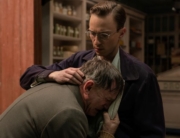What first appears as a film about a 15-year-old boy and his horse is really a film about the boy, Charlie, trying to find a family. It’s a patchwork: part indie drama, part inspirational tale gone haywire, and part road film. Like Charley, the film neatly eschews simple classification—it, like the main protagonist, just keeps going. It’s unrelenting. It’s also a well-made, beautiful film that arguably mires itself in pretense and implausible plot points.
An adaptation of a 2010 novel by Willy Vlautin, Lean on Pete loosely follows Charley Thompson (Charlie Plummer) as he struggles to deal with the loss of his dad Ray (Travis Fimmel). Charley befriends the horse racing, alcoholic curmudgeon Del (Steve Buscemi) and comes to care for a quarter horse, Lean on Pete. We learn early on that Ray has been dating a woman (Amy Seimetz), who is married. Late one night, her husband finds where Ray and Charley live and starts a fight with Ray and throws him through a sliding glass door, which punctures his stomach. Ray soon dies from sepsis. Charley, refusing to become a ward of the state, runs from the hospital. It’s hard to conceive of a kid running from the hospital unsupervised, but Plummer gives the scene urgency; the audience palpably feels this need to run.
Charlie gathers his things and begins living in the horse stalls. When he realizes Pete is to be sold for slaughter (from not winning enough races), he steals the horse, a truck, and a trailer. He’s trying to make it from Portland, Oregon, to Jackson, Wyoming, to be reunited with an estranged aunt.
Visually, the film is muted and tense. The color palate is mostly neutral. The camera always seems removed from Charley’s actions, and seemingly banal conversations become uneasy. The whole film feels like something catastrophic could happen at any second.
The teen is constantly on the run. He runs for sport, for fun, and to clear his mind. He seems to have no settled place in the world. He and his father have moved around constantly, and he has no friends. For half of the film, Charley seems to be alone in the frame. He’s isolated in an unyielding world in which he has little agency, and this is one of the strongest aspects of the film. It’s a representation of what little power the poor have. Charley’s only choice is really to either be tossed around in the legal system or flee. Plummer masterfully embodies Charley, guided by the acute and empathetic eye of Haigh. Chloë Sevigny also deserves praise for her touching portrayal of Bonnie, Del’s longtime jockey. She’s perceptive of Charley’s pains in a way no one else is. Sevigny gives Bonnie a weathered softness, and it’s absolutely touching.
No matter how well acted, the movie tends to lose its veneer of thoughtful humanism and slides into absurdity. Its strongest facets also become its weakest—a poor orphaned kid somehow manages to steal a truck and a horse and cross several state lines. Critiquing films for their lack of realism misses the point that movies don’t have to be realistic to be good, but the story line dabbles in the inadvertently stereotypical or illogical, whether it’s the clichéd representation of poor white masculinity (beer drinking, misogynist, non-intellectual) or the inescapable feeling that a kid wouldn’t be able to run away from the cops so easily five separate times, and in four separate states. At times, the unrelenting catastrophic events wear on an audience. For a film constructed to feel catastrophic and unpredictable, it eventually follows a pretty strict formula. See Lean on Pete for its humanity, but beware of its inexorable plot.







Leave A Comment